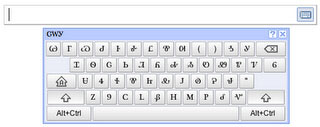You can now select Cherokee as your default from the Language Tools page (available from the right of the search box), and the entire Google interface will transform into Cherokee:
Cherokee Chief Chad Smith explained the reason for the move poignantly, “We have been working hard to get our young people interested in learning our Native tongue but we cannot be successful unless they can read and write in the medium of their era – all the digital devices that are currently so popular.”
An on-screen Cherokee keyboard on the search page has been included through the Google Virtual Keyboard API. This makes it easier for people to search web content in Cherokee without a physical Cherokee keyboard. To access the keyboard, simply click the icon at the right side of the search box.

An on-screen Cherokee keyboard on the search page has been included through the Google Virtual Keyboard API. This makes it simpler for people to go looking web content in Cherokee with no physical Cherokee keyboard. To access the keyboard, merely click on the icon on the proper facet of the search box.
Cherokee is an Iroquoian language spoken by the Cherokee people. The Cherokee syllabary writing system was developed by Sequoyah within the early 19th century. He realized the power of writing methods, and wished his people to learn from that power. Among the 85 characters he developed for his syllabary were modified from his original.
A few of the 85 characters he developed for his syllabary were modified from his unique handwritten script for a printing press in the 1820s, leading to characters that resemble Latin and Greek letters. Despite the resemblance, they are pronounced differently. The modified script was quickly tailored for printing Cherokee newspapers, books and pamphlets. The adoption and use of the script enabled the Cherokee folks to take care of their language and culture. As we speak, Cherokee is spoken mostly in the states of Oklahoma and North Carolina. (The Cherokee Nation is the sovereign working authorities of the Cherokee people. It is a federally recognized tribe of greater than 300,000 Cherokee residents, with its capital located in Tahlequah, Okla. To learn more, please visit www.cherokee.org.
Now there is search available in 146 interface languages-and the record is growing. When you speak an endangered language that you would like us to assist, please sign up for Google in Your Language and submit neighborhood translations.
What's notable about this is again the symbolism and the truth that the Web has indeed turn into the linguistic medium of our era. If there's a language that you would be able to't Google in, does it stop to exist?

No comments:
Post a Comment